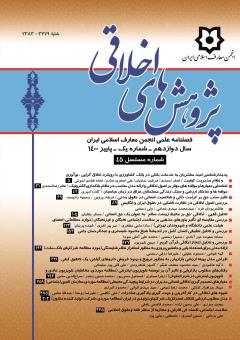بررسی مقایسه ای تأثیر باورهای مذهبی بر سلامت اجتماعی نخبگان و غیرنخبگان (موارد مطالعاتی: اعضای هیئت علمی دانشگاه و شهروندان تهرانی)
محورهای موضوعی : اخلاق اجتماعی و مدل سازی رفتاریسارا حاجی مظفری 1 , نیره پیراهری 2 , شیده پرنیان 3
1 - دانشگاه آزاد اسلامی ، گرمسار
2 - دانشگاه آزاد اسلامی واحد گرمسار
3 - دانشگاه آزاد اسلامی واحد گرمسار
کلید واژه: سلامت اجتماعی, باورهای مذهبی, نخبگان, غیرنخبگان,
چکیده مقاله :
نوشتار حاضر به بررسی تحلیلی و مقایسه ای بین باورهای مذهبی و سطح سلامت اجتماعی در دو جامعه نخبگان و غیرنخبگان پرداخته است. چارچوب نظری پژوهش برمبنای نظریه های کییز، و دیدگاه نظریه پردازان کارکردگرا می باشد. در پژوهش حاضر از روش پیمایش استفاده شد و جامعه های آماری آن را اعضای هیئت علمی دانشگاه آزاد اسلامی واحد تهران مرکز و شهروندان فاقد تحصیلات آکادمیک شهر تهران تشکیل دادند. حجم نمونه آماری جامعه نخبگان 265 نفر و جامعه غیرنخبگان 385 نفر برحسب فرمول کوکران برآورد گردید. تحلیل داده ها با نرم افزار spss انجام شد. یافته های پژوهش نشان داد که بین باورهای مذهبی و سلامت اجتماعی در جامعه نخبگان و غیرنخبگان رابطۀ مستقیم معنی دار وجود دارد. از میان ابعاد باورهای مذهبی، بعد عمل به وظایف با هیچیک از ابعاد سلامت اجتماعی بجز پیوستگی اجتماعی رابطۀ معنی دار ندارد. همچنین رابطه بعد اعتقادی و عاطفیِ مذهب با سلامت اجتماعی جامعه نخبگان بیشتر از جامعه غیرنخبگان است. از طرفی متغیرهای زمینه ای سن، درآمد، تحصیلات با سلامت اجتماعی رابطه معنی دار دارد. همچنین متغیرهای عواطف مذهبی، تحصیلات، عمل به وظایف مذهبی و سن به ترتیب 7/21 درصد از تغییرات سلامت اجتماعی را تبیین می کنند.
The present article is an analytical and comparative study between religious beliefs and the level of social health in both elite and non-elite communities. The theoretical framework of the research is based on Keys' theories and the views of functionalist theorists. In the present study, the survey method was used and its statistical populations consisted of faculty members of the Islamic Azad University, Central Tehran Branch and citizens without academic education in Tehran. The statistical sample size of the elite population was 265 and the non-elite population was 385 according to the Cochran's formula. Data analysis was performed with SPSS software. Findings showed that there is a significant direct relationship between religious beliefs and social health in the elite and non-elite community. Among the dimensions of religious beliefs, the dimension of performance of duties has no significant relationship with any of the dimensions of social health except social cohesion. Also, the relationship between the religious and emotional dimensions of religion and the social health of the elite community is greater than the non-elite community. On the other hand, the contextual variables of age, income, education have a significant relationship with social health. Also, the variables of religious emotions, education, religious duties and age explanation 21.7% of changes in social health, respectively.
